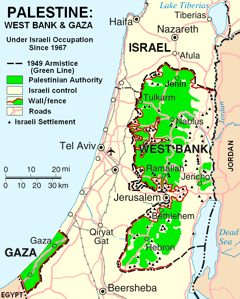A glimpse into the Israel-Palestine Conflict
January 23, 2017
Since the Biblical era, the conflict between Israel and Palestine over certain lands has generated a substantial issue between the two entities.
Palestine is significant to the religion of Islam because Jerusalem is considered the third-holiest city in the region, following Mecca and Medina in Saudi Arabia. The Prophet Muhammad ascended into heaven at the al-Asqa Mosque in Jerusalem, which is the reasoning behind the city’s religious prominence.
In Judaism, congregants believe that Palestine is rightfully Jewish territory, because Palestine was the land that God granted Moses on the Jewish exodus from Egypt. The Jewish people developed the land and established a monarchy, along with building the two Jewish Temples of Jerusalem in 957 BC. According to Zionism, a philosophy that called for the reestablishment of a Jewish nation, the land of Palestine is considered Jewish territory due to the historical Jewish ties to the region. However, the Palestinians believe the area is rightfully Muslim due to Palestine’s Islamic presence since the 630’s.
Throughout history, Palestinians have been removed numerous times from their homeland; the Balfour Declaration of 1917 is the first example of their removal. In the declaration, scripted during WWI, British Foreign Secretary Arthur Balfour noted that Britain was in support of the Zionist movement to help gain Jewish support in European countries. As a result, Britain was granted a mandate over Palestine in the Treaty of Versailles, producing an opportunity to establish a Jewish state.
In the 1940’s, despite Palestinians’ anger, the international community urgently created a solution in which Jewish people could be granted sanctuary from their attempted extermination in the Holocaust during WWII. Catalyzed by David Ben Gurion on May 14, 1948, the State of Israel was created in order to establish the Jewish homeland in Palestine. As expected, the irate Palestinians argued that Israel’s establishment paid no respect to supposed Palestinian sovereignty.
However, on May 15, 1948, the Arab-Israeli War commenced and the Palestinians began to attack Jewish settlements and forces. After the war’s conclusion of Israeli victory, the Holy Land was divided into three sectors, Israel, the West Bank (Jordanian territory) and the Gaza Strip (Egyptian Territory).
In response to the lack of Palestinian nationalism, Mahmoud Abbas created the Palestine Liberation Organization (PLO) in 1964 to attain liberation for Palestine through armed struggle. Three years later, the tense relationship between Israel and the Middle East catalyzed the Six-Day War in 1967, where Israel was pitted against six Middle Eastern nations due to them acquiring the Gaza Strip and the West Bank from Egypt and Jordan.
After the conclusion of the Six-Day War ended in Israeli victory, the PLO campaigned for heinous terror against Israelis. Now headed by the Islamic fundamentalist organization Hamas’ leader Yasser Arafat, the PLO commenced attacks by Hamas against Israelis including the Coastal Road Massacre of 1978, which killed thirty-nine Israelis.
Despite territorial wars concluding after the Camp David Accords between Israel, Egypt and the United States in 1978, violence resurged in 1987 with the emergence of the First Intifada. In the intifada, thousands of Palestinians in the Golan Heights and the West Bank rebelled against their Israeli neighbors for five years. Although, Arafat and the PLO eventually agreed to a peace treaty with Israel in 1993 called the Oslo Accords. The accords created the Palestinian Authority, a functioning body for self-governance in the Gaza Strip and the West Bank and also called for Palestine to recognize Israel’s right to exist.
Despite a Second Intifada and the continuous exchange of rockets launched into Israel and Gaza, Palestine was accepted to the United Nations as a non-member observer in 2012. The conflict between Israel and Palestine was critically altered in Dec. 2016, when a United Nations resolution called for the immediate halt of Israeli settlements in areas such as the West Bank and East Jerusalem because of the “illegality of their location in the Occupied Palestinian Territories.”

























Smithb601 • Mar 10, 2017 at 3:32 PM
Thanks for another wonderful article. Where else could anybody get that kind of information in such an ideal way of writing? I have a presentation next week, and I’m on the look for such information.